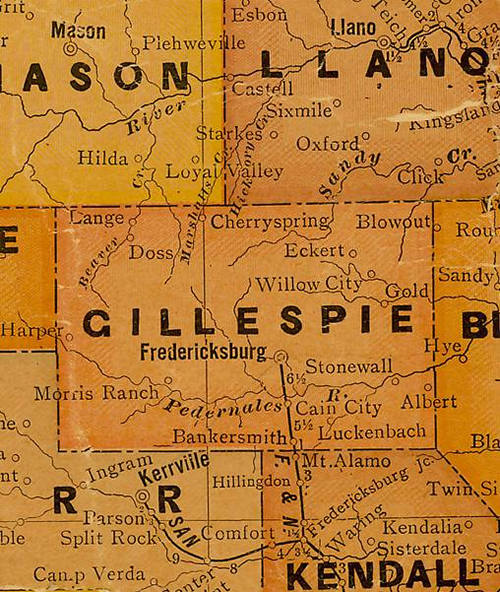Books by
Michael Barr
Order Here: |
|
Pedernales,
Texas was a tiny scattered village 7 miles southwest of Fredericksburg.
Dr. Victor Keidel
founded the settlement and gave it a jump start by offering free medical
care to any family that would join him.
The village took its name from the lazy river that zigzags, loops
and u-turns through this part of the Texas
Hill Country. Spanish explorers and missionaries in the 18th century
named that river Pedernales after the Spanish word for flint rocks.
Fredericksburg,
settled in 1846, has a close association with the river.
The early settlers in Fredericksburg
came from Germany with the help of the Adelsverein, an association
of German noblemen. The Adelsverein promised medical care to the Fredericksburg
settlers and sent Dr. Wilhelm Victor Keidel, from Hildesheim, Hanover,
to fulfill that part of the contract.
In his early days in the Texas Hill Country, Dr. Keidel mixed medicine
with politics. He signed the petition to create Gillespie
County on December 15, 1847, and he served as county judge from
1848 to 1851. |
 |
Gillespie
County 1920s map showing the Pedernales River
From Texas state map #10749
Courtesy
Texas General Land Office |
But Dr. Keidel
longed for the quiet life of a country doctor, and soon after hanging
out his shingle in Fredericksburg, he relocated to a farm on the Pedernales
River not far from the mouth of Bear Creek in southern Gillespie
County. He called the settlement Pedernales. Other settlers
followed him there, drawn by the beauty, the solitude and the promise
of free healthcare.
Dr. Keidel touted the physical and mental benefits of life in a quiet
farming community like Pedernales. When asked his formula for healthy
living, he always said "Gute Nahrung und Ruhepause" (good food and
rest).
Among the Germans who followed Dr. Keidel to Pedernales were photographer
and landscape artist Hermann
Lungkwitz and his brother-in-law and fellow painter Richard Petri.
Jacob Kuechler and his wife Mari Petri Kuechler (another sister to
Richard Petri) came to Pedernales after the Bettina
Colony on the Llano
River fizzled. Jacob Kuechler was a surveyor, a Union officer
and a survivor of the Battle of the Nueces. In the 1870s he served
as Commissioner of the Texas General Land Office.
As the village of Pedernales grew, Dr. Keidel and some of his neighbors
organized the Live Oak School. The doctor served on the first board
of trustees. He also founded a political and cultural club called
the Society for Good Fellowship and Promotion of General Information.
When he wasn't seeing patients or at school board meetings, Dr. Keidel
planted trees along the road leading into Pedernales. He did everything
he could to promote his community and make it grow.
Then in 1865 Dr. Keidel moved back to Fredericksburg.
He died in 1870.
He left behind a village with 2 stores, a cotton gin, a school and
just shy of 50 scattered residents. The community built a native limestone
schoolhouse sometime prior to 1875 to house grades 1 through 7. State
funds and private tuition paid for the teacher's salary and some school
supplies.
The school was the center of community life. The Texas Historical
Marker at the site reads "Picnics on 'schulpruefung' (final exam day),
Christmas programs and music practices became traditional activities
at the school." Those programs were the glue that held Pedernales
together.
For the next 70 years, time stood still in Pedernales. It was a community,
but it never really gathered enough steam to become a town. It never
made much noise or attracted much outside attention. It was never
more than a wide spot in the road.
Then after WWII,
Pedernales and other small communities all over Gillespie
County were undercut by automobiles, supermarkets and school consolidations.
Economic and social forces caused a decisive turn away from small
town life. Hard roads bypassed Pedernales and other small villages,
leaving them lost in time - cut off with the modern world. Young people
left for good jobs in the city leaving aging rural communities stranded
and demoralized.
In 1949 Live Oak School consolidated with Wrede School. When the school
closed, Pedernales slowly died.
Today the old school house is a private residence. It is the only
visible trace of Pedernales, Texas that remains. |
|
|
